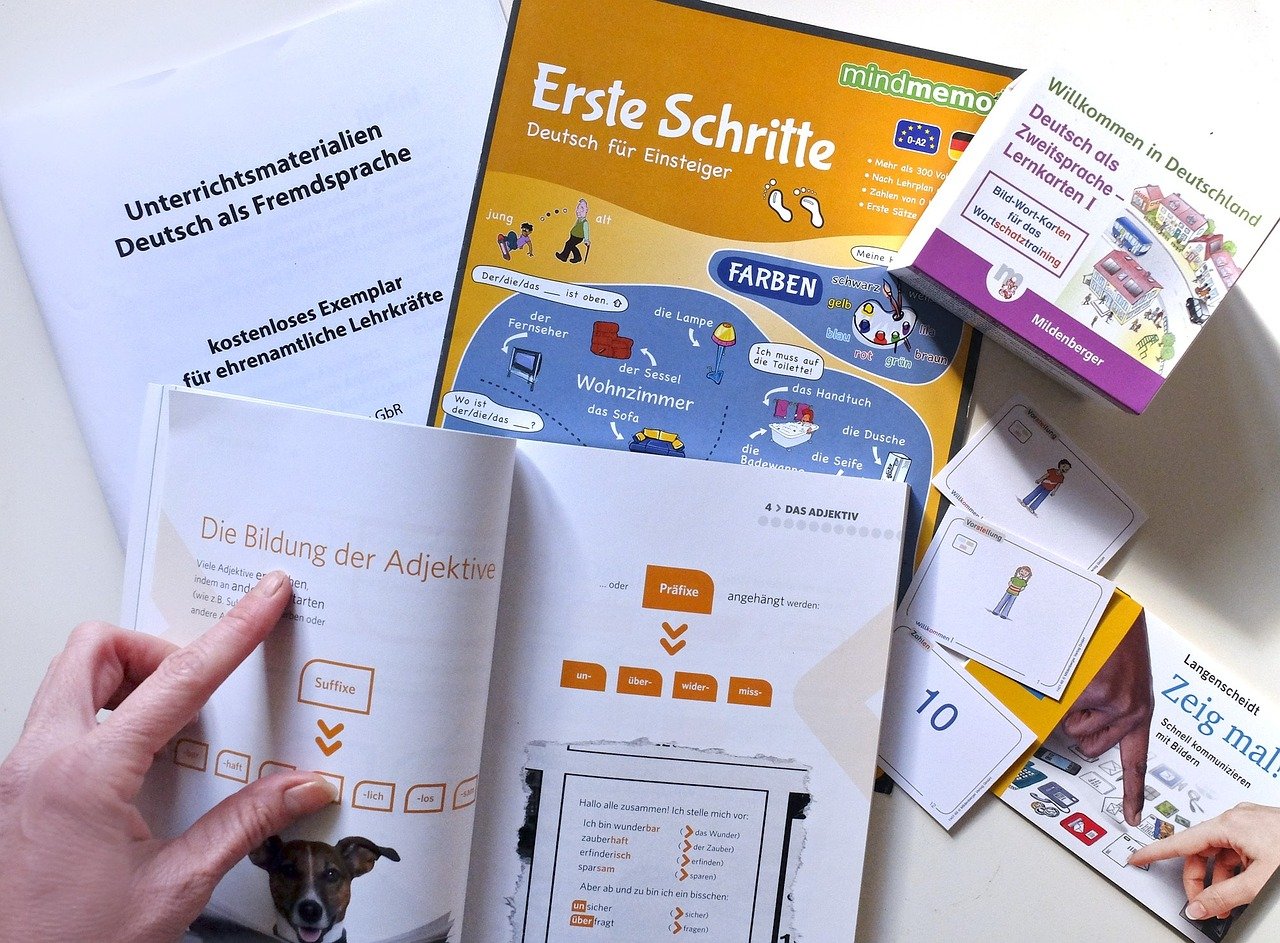Do you want to learn German? Or, worse…do you have to learn German?
I learned German in about three years. Last November, I took the TELC Deutsch C1 Hochschule exam and passed. Officially speaking (which is, incidentally, the best way to speak in Germany) I am a “proficient” or “advanced” user of the German language.
If the idea of learning Mark Twain’s least-favorite language sounds daunting, but you want (or have) to do it anyway, keep reading. I’m going to share exactly how I learned German, step-by-step, as well as all the ways I’d refine my process to (potentially) learn even faster.
General Tips for All Levels
First, you need to determine what kind of learner you are. Do you learn best in a classroom or on your own? If you want to learn German on your own, can you commit to textbooks or would you prefer to use an app?
In this section, I’ll go over what language schools, apps, and textbooks I have personally found useful, as well as general tips and tricks.
Learning German in a Classroom
- Got the cash? Take your courses at the Goethe Institut. They are the gold standard for a reason. I learned more in my intensive, two week B2.2 course at Goethe than in any other German class I’ve ever taken.
- Can’t afford Goethe? If you’re in Germany, your next-best option is your local VHS (Volkshochschule).
- If you decide to go with another language school, make sure they actually teach the grammar. Certain chain schools claim that they can teach you the language “intuitively.” That is a lie. You need to learn the grammar.

Learn German on Your Own with Apps
- Babbel is a great app if you have the money. It’s very pricey, but they run a lot of deals, so don’t get tricked into paying full price.
- Need something cheaper? Or free? Try DuoLingo. Just make sure you also invest in a grammar workbook.
Textbooks and Workbooks
Obviously, if you’re signed up for a class, you don’t need to buy extra textbooks. I do, however, highly recommend getting a grammar workbook to supplement your learning.
If you can’t buy these books where you live, look for alternatives that have levels. Books that simply say “learn German” on the cover aren’t likely to be well organized or complete.
Alternatively, sometimes free PDF’s can be found online. Or so I’ve heard…

My Textbook Recommendations:
- For levels A1 – B1: The Menschen series from Hueber. Remember to buy both the textbook (Kursbuch) and workbook (Arbeitsbuch)
- For levels B2 – C1: The Sicher! series from Hueber
If you don’t live in Germany, you can order the Hueber textbooks directly from their website.
My Grammar Workbook Recommendations:
- Grammatik Aktiv A1 – B1 from Cornelsen
- Grammatik Aktiv B2 – C1 from Cornelsen
- The Grammatik series from Schubert (A Grammatik, B Grammatik, and C Grammatik)
Tips for Solo Learners
- I know it’s a cliché, but it’s true; consistency is key. Make yourself a schedule that you can stick to, and get at least a half hour of practice every day, as well as a little practice in reading, listening, speaking and writing every week.
- Writing scripts of imaginary conversations, and then reciting them out loud, can be very helpful for speaking practice.
- Not taking a class? Use DeepL to correct your writing, by creating a “correct” copy to compare to what you’ve written.
A1 to A2: Beginner German
If you learn well on your own, you don’t need to take a class at the lower levels. Everything will be so basic, that you won’t be missing out on much. Classes do have one major benefit, though: if you’re living in Germany, taking a German class is the best way to make new friends.

I got through A1 and A2 with apps.
Learning this way was fine; especially for A1. My grammar knowledge was seriously lacking, though. If I had to go back and do it all again, I would supplement my learning with a grammar workbook, so I could have a solid foundation right from the start.
General Tips for Solo Learners
- Learning with textbooks? After completing each listening exercise, find the script for the audio and listen again; this time, while following along with the transcript. Then, read the dialogue out loud a few times. This will improve your listening and speaking abilities.
- If you’re learning with an app (especially DuoLingo), check out my list of supplementary materials under B1: Intermediate German. The videos listed there will help you get used to hearing German from native speakers.
- Use supplemental materials made for your level, like the Super Easy German playlist from Easy German.
B1: Intermediate German
At this point, apps won’t be enough; you will need to either attend classes, or work through a textbook and workbook on your own.
I started taking classes at this point. However, I am confident that it’s possible to get through B1 (and, honestly, all levels) without setting foot in a classroom; you just need to get regular speaking practice, and have a native speaker proofread your writing. If you don’t have any German friends or family, you can try a site like Tandem or iTalki.
General Tips
- Use supplemental materials geared towards your level. My recommendations are:
- The Super Easy German playlist from Easy German, as well as their B1 videos.
- Deutsche Welle has level-appropriate and free interactive lessons, games, news, and videos to help you learn German.
- Short stories specifically for B1/intermediate learners can help you get ready to start reading “real” news and books.
- Clozemaster is a great tool for broadening your vocabulary and improving your grammar.
- If you need to take a B1 test in order to stay in Germany, I don’t recommend learning completely on your own; especially if you rarely have opportunities to speak German in your day-to-day life. Take a class, or at least supplement your self-study with private lessons once per week, so your teacher can proofread your writing.

B2: Upper-Intermediate German
If you’ve been taking classes, your teacher has probably said at some point that there’s a huge “gap” between B1 and B2. The expectation (if you live in Germany) is that you stop for a while after B1, get some real world experience with the language, and then take a B2 class a few years later.
Seriously; it’s such a leap that they even sell B1+ grammar books for people who are done with B1, but aren’t feeling ready for B2.
I really struggled in my B2.1 class. B2.2 was easier for me, but that was because I took the time to go back and learn the A2 – B1 grammar I hadn’t really learned the first time around. In the end, though, it wasn’t “enough” and I had to repeat B2.2 at the Goethe Institut in Dresden.
General Tips
- Dedicate at least an hour of your day to learning German. That may sound like a lot, but it’s really not. Listen to a German podcast during your commute. Instead of watching something in English, choose a German TV show or movie instead. Read a chapter of a German book before bed.
- Watch German movies, documentaries, TV shows and YouTube videos that have German subtitles.*
- Watch the nightly news in German.
- If you live in Germany, the Tagesschau is presented live with subtitles. You can also find it on the ARD Mediathek.
- If you don’t live in Germany, the Tagesschau is available (without subtitles) on YouTube.
- Start off with novels meant for middle schoolers, and work your way up to the teen/young adult section.
- Read the news. Start off with Nachrichtenleicht and then move on to the Tagesschau after you’ve advanced.
- Listen to scripted podcasts* on a theme. Scripted podcasts are great for your level because they speak clearly, choose their words carefully, and (generally) have a neutral accent.
- Don’t slack on writing practice. Even if your teacher makes the writing exercises in your book optional, consider them mandatory for yourself.
C1: Advanced German
Good news! Unlike going from B1 to B2, going from B2 to C1 won’t feel like a huge leap. In fact, I would say B2 was much, much harder for me than C1.
Once you have that foundation laid, C1 is really just a matter of learning that last bit of grammar, expanding your vocabulary, and immersing yourself in German outside of your textbooks.

The most important thing to remember is that you need to practice every day. Just like with exercise, the key to success is to find something you enjoy. So, if you find your attention continually drifting during something you’re reading, find a new article. Don’t really like what you’re watching? Try a different movie. Does that podcast suck? Unsubscribe.
You get the idea.
Improve Your Reading and Listening Skills
- Diversify what you read. Don’t just read the news; read long opinion pieces on sites like Deutsche Welle, Die Zeit and Der Spiegel, as well as articles on scientific discoveries, art exhibits, theater, technology, and history.
- Or…subscribe to a magazine! If I had to do it all over again, I’d subscribe to NatGeo or Der Spiegel.
- Listen to unscripted podcasts with people “just talking,” so you can get a feel for how “real” people talk.*
- If you don’t live in Germany, you can watch a lot of full German TV shows, documentaries, and reports on YouTube.*
Improve your Speaking and Writing Skills
- Get a notebook and write down new words you come across that you couldn’t figure out from context, along with their definition and the original sentence. Review once per week.
- Try to write at least 350-700 words per week. I used the German version of Table Topics for writing prompts.
- If you don’t have anyone to speak German with, look for a tandem speaking partner. Paying for a private teacher is a good alternative if you’re planning on taking an exam, so you can just focus on your learning needs.
*If you would like my specific recommendations, check out this post on my favorite German podcasts, TV shows, movies and more.

